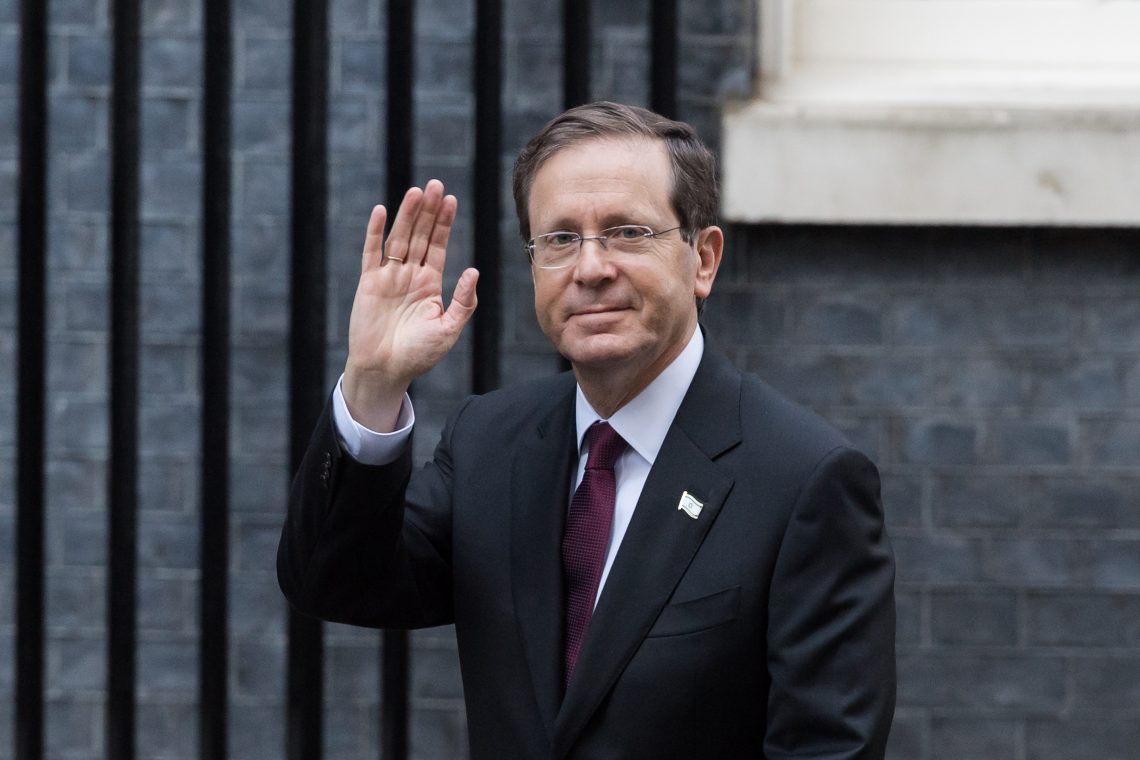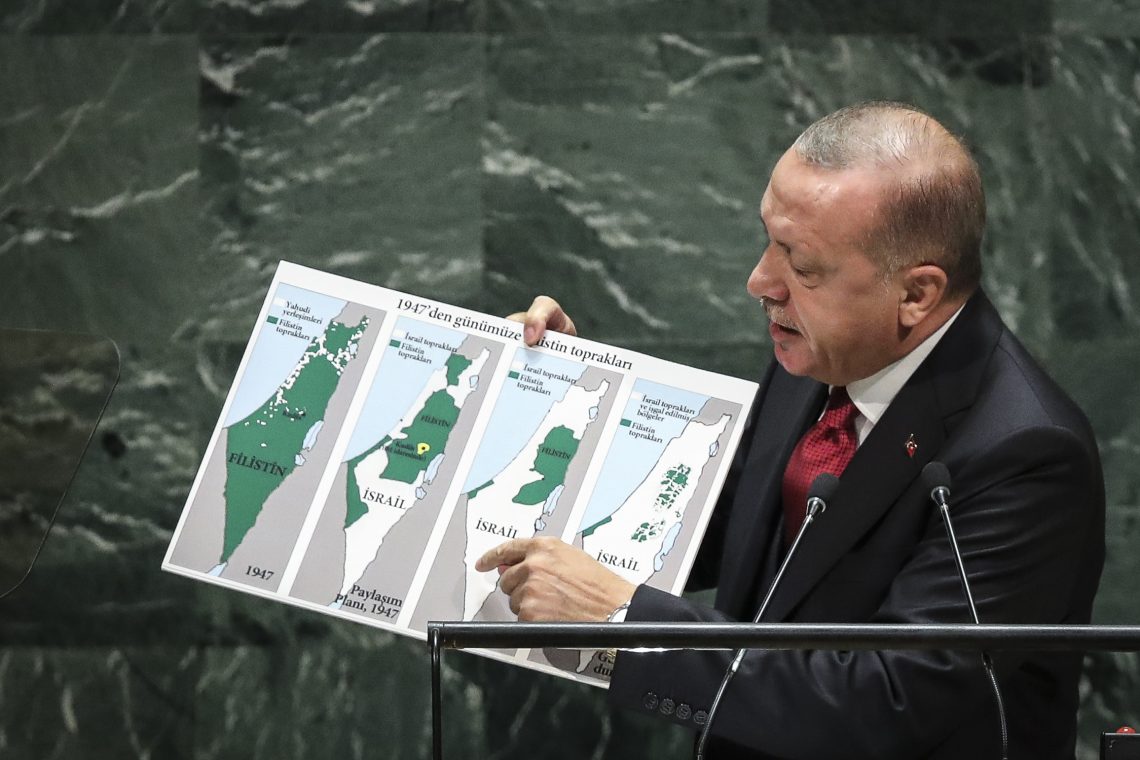Is rapprochement between Israel and Turkey really possible?
Israelis are skeptical of President Erdogan despite President Herzog’s visit to Turkey.

In a nutshell
- Erdogan’s anti-Semitic rhetoric leaves Israelis skeptical of his motives
- Turkish-Israeli relations have worsened under Erdogan’s rule
- Herzog’s March 9-10 visit to Turkey will be closely watched
Since his accession to power in 2003, President Recep Tayyip Erdogan has brought relations between Israel and Turkey to all-time lows. He has employed extreme rhetoric tinged with anti-Semitism to whittle away extensive and multifaceted links with Israel. Worse, he welcomed Hamas terrorists and let them plan attacks against Israel. So far there has been no sign of a change in his policy.
Nevertheless, in the past year, President Erdogan has on several occasions expressed his wish for a better relationship with Israel and will host a visit to Turkey by Israeli President Isaac Herzog on March 9-10. The Israeli leader scheduled visits to Ankara and Istanbul. It should be noted that the Turkish leader has embarked on a similar course of “reconciliation” with Egypt, which is yet to bear fruit.
President Erdogan had greater success with the United Arab Emirates. Crown Prince Mohammed bin Zayed welcomed the opportunity to reinforce Gulf countries faced with the Iranian threat. The Turkish leader is even reported to seek some form of normalization with Armenia. Hence Israel’s dilemma: take these overtures at face value or as just another ploy by an embattled president whose country is teetering on the brink of an economic and political abyss?
Europe is largely silent, cowed by the threat of unleashing millions of refugees from Middle East conflicts toward its shores.
The Turkish president has failed dismally in his attempts to revive the glory of the Ottoman Empire by turning his country again into a regional superpower and defender of Islam. He issued new maps extending Turkish boundaries to include Mosul in Iraq and parts of the Balkans. He supports the Islamic Brotherhood and Qatar – hub of the movement and other radical Islamic organizations – thereby souring relations with Saudi Arabia, the Emirates and Egypt. He uses Syrian Islamic rebel militias as proxies to conquer Kurdish territories in Syria, carry out ethnic cleansing and replace local populations with Sunni Syrians who had taken refuge in Turkey.
Europe is largely silent, cowed by the threat of unleashing millions of refugees from Middle East conflicts toward its shores. Though a NATO member, Turkey has defied that organization and the U.S by acquiring S-300 anti-missile systems from Russia. As a result, Washington canceled the sale of advanced F-35 fighters. Now Ankara finds itself in conflict with Europe, the United States and Arab states at a time when help is desperately needed to bolster its failing economy. Financial institutions are threatened by 35 percent inflation while the currency is in free fall, the lira having lost 45 percent of its dollar value since 2021 and trading at 14 to 1.
Long history
The current situation is hard to believe, considering Turkey recognized the state of Israel in 1949 and opened diplomatic representation in 1950, the first Muslim state to do so in spite of protests throughout the Arab world. At the same time, it remained attuned to the Islamic world and more specifically to Arab states. Relations with Israel ebbed and flowed to the rhythm of Arab wars with Israel and flare-ups with the Palestinians.
Periods of intense military and intelligence cooperation were followed by lengthy cooling off and downgrading of diplomatic representations. Yet relations were never severed. Turkey understood the value of the Israeli card to demonstrate its independence and unique character and was aware of its usefulness to promote links with the U.S. Trade between the two countries remained brisk and reached $6 billion in 2021, with Turkish exports accounting for double Israeli imports. This figure does not include tourism. Turkey remains a popular destination for Israelis.
There were a few rocky years following the creation of the Baghdad Pact in 1955 and the Suez Crisis in 1956, with Turkey recalling its representative in Israel, vowing he would not return until the Palestinian issue was solved. However, behind-the-scenes negotiations between Prime Minister David Ben-Gurion and his Turkish counterpart Adnan Menderes led to the so-called unwritten peripheral pact, comprised of non-Arab Muslim states, Turkey and prerevolutionary Iran but also Ethiopia. It came crashing down after the Six-Day War in 1967 followed by the Ethiopian revolution of 1974 and that of Iran in 1979. Turkey gave its full support to Arab states both in the Six-Day and the Yom Kippur wars, voted the infamous resolution branding Zionism as racism and encouraged the First Intifada in 1987.
The situation improved following the 1991 Madrid Conference and the Turkish ambassador returned to Israel. The next two decades brought a significant rapprochement marked by the visit to Israel of the Turkish chief of staff in 1997. Military and security cooperation grew, and Israel was tasked with refurbishing Turkish tanks. A free trade agreement went into effect, also in 1997.

Erdogan era
President Erdogan’s rise to power, first as prime minister in 2003 and then as president since 2014, signaled the end of that golden age. The launching of Operation Cast Lead in 2008 as a result of continuous missile firing from Gaza to Israel’s towns and villages led to scathing condemnations from the Turkish leader, who claimed it was “a crime against humanity” and demanded Israel be expelled from the United Nations. Worse was to come in 2010 with the Mavi Marmara incident. Israeli patrol boats that stopped the so-called Gaza Freedom Flotilla were met with violent resistance by members of the IHH, allegedly a Turkish benevolent organization linked to Hamas. Ten of them were killed in the ensuing fight. President Erdogan recalled his ambassador. It later transpired that the IHH militants had convened a press conference in the port of Anatolia before sailing and vowed to die as martyrs. Then President Barack Obama took the initiative to mediate and talked Prime Minister Benjamin Netanyahu into “apologizing” to Mr. Erdogan and accepting to pay $24 million in compensation to the Turkish victims. The Turkish president, undeterred, went on calling Israelis “baby killers” similar to the Nazis.
Under President Erdogan’s leadership, Turkey is also trying to interfere in social and political issues inside Israel, seeking to undermine Israeli rule in Jerusalem and fomenting trouble on the Temple Mount. Turkish agents posing as pilgrims were sent to the Holy City to disseminate radical Islamic discourse, distribute money to the needy and help revive Muslim institutions while inciting violence against Israel. According to their own official declarations, more than $40 million were invested in these activities by the consulate of Turkey in Jerusalem and two other Turkish organizations.
Hamas’s militants were given free rein to plan from Turkey terror attacks against Israel, without fear of retaliation. Pro-government media did state that the Muslim Brotherhood and TV channels endlessly broadcasting hate messages had been shut down and Saleh al-Arouri, Hamas top commander directly responsible for these attacks, had been expelled. However, others remained and Hamas still pursues its activities from Turkey. This would be a serious impediment to rapprochement.
Both sides are aware that reconciliation is still a long way ahead and relations will never go back to their pre-2002 level.
In November 2021, a couple of Israeli tourists, both employed as drivers by Israel’s largest transportation company Egged, were accused of spying and jailed for having taken pictures of the presidential palace in Ankara. It took the combined intervention of President Herzog and Prime Minister Naftali Bennett to secure their release after appealing to the Turkish president, who took the opportunity to emphasize that he was looking to improve relations. A month later he invited the participants in the inaugural conference of the Alliance of Rabbis in Islamic States (ARIS) in Istanbul – once home to half a million Jews, with less than 25,000 today – to a meeting in his palace in Ankara. He allegedly spoke strongly against anti-Semitism. Yet a few months earlier, in May, during the Keeper of the Walls operation, President Joseph Biden had rebuked him for having said: “They are murderers, to the point that they kill children who are 5 or 6 years old. They only are satisfied by sucking their blood…It is in their nature.”
So why would he want to improve relations with the Jewish state? Does he believe the move would be welcomed by Washington? That it would weaken the political and economic coalition set up by Israel, Cyprus and Greece? He has already been quoted as saying that Turkey would like to offer an alternative to the planned EastMed pipeline – at an estimated cost of $7 billion – intended to carry natural gas from Israel, Cyprus and even Egypt and Greece offshore fields to Italy and Europe, and proposed to switch to transit through Turkey. The U.S. has of late spoken against EastMed because of the cost and ecological damage. Instead, Washington has suggested linking Greek and Egyptian electricity grids with a view to including African states at a later stage, and those of Israel and Cyprus providing for clean energy. Some believe the White House has an ulterior motive: defusing regional tension in the Eastern Mediterranean.
Scenarios
It is, of course, too early to evaluate the impact of the conflict raging in Europe, which will most likely have implications in the Middle East as well. However, with the Nord Stream 2 now on hold indefinitely, there will be renewed interest in the project and Washington may revise its position.
But what would be Israel’s interest? It is no longer isolated and enjoys excellent relations with many Middle East countries, the Abraham Accords and a strong economy relying on innovation and high tech. Still, dissipating Turkish hostility and entering into cooperation with that country is a worthy goal – but not at any price. Lately, Israel gave a few hints about the discreet talks going on. President Herzog’s office said that, during his last conversation with his Turkish counterpart to wish him a fast recovery from Covid-19, his visit to Turkey was also discussed. According to Israeli diplomatic sources, there were no preconditions imposed; however, of late Erdogan seems to keep Hamas members away from Turkey. It has not allayed Israel’s suspicions and Prime Minister Bennett is treading cautiously regarding President Erdogan’s renewed interest in strengthening ties with Israel. Emphasizing that the rapprochement will not be at the expense of the Israel, Cyprus and Greece alliance forged in the last years, President Herzog traveled to Athens and Nicosia last week and discussed increased cooperation between those three countries.
Israel’s decision is hampered because the Turkish president blows hot and cold. On the one hand, he calls his Israeli counterpart to express condolences on the death of his mother and says he looks forward to meeting him; on the other, his foreign minister stated on February 8 that his country would not abandon its commitment to a Palestinian state for closer ties with Israel. Even the pro-Erdogan media has not stopped its attacks; on January 31, the Erdogan-friendly Daily Sabah hinted that Jewish influence was behind “the deportation of Armenians.”
Will Ankara be willing to act effectively against Hamas militants on its soil, a prerequisite for Israel? With Turkish presidential elections scheduled for June 2023, can Mr. Erdogan refrain from anti-Semitic utterances and violent attacks on Israel in order to curry favor from his Islamic base? It seems that Jerusalem will nevertheless make the attempt, though both sides are aware that reconciliation is still a long way ahead and relations will never go back to their pre-2002 level.








